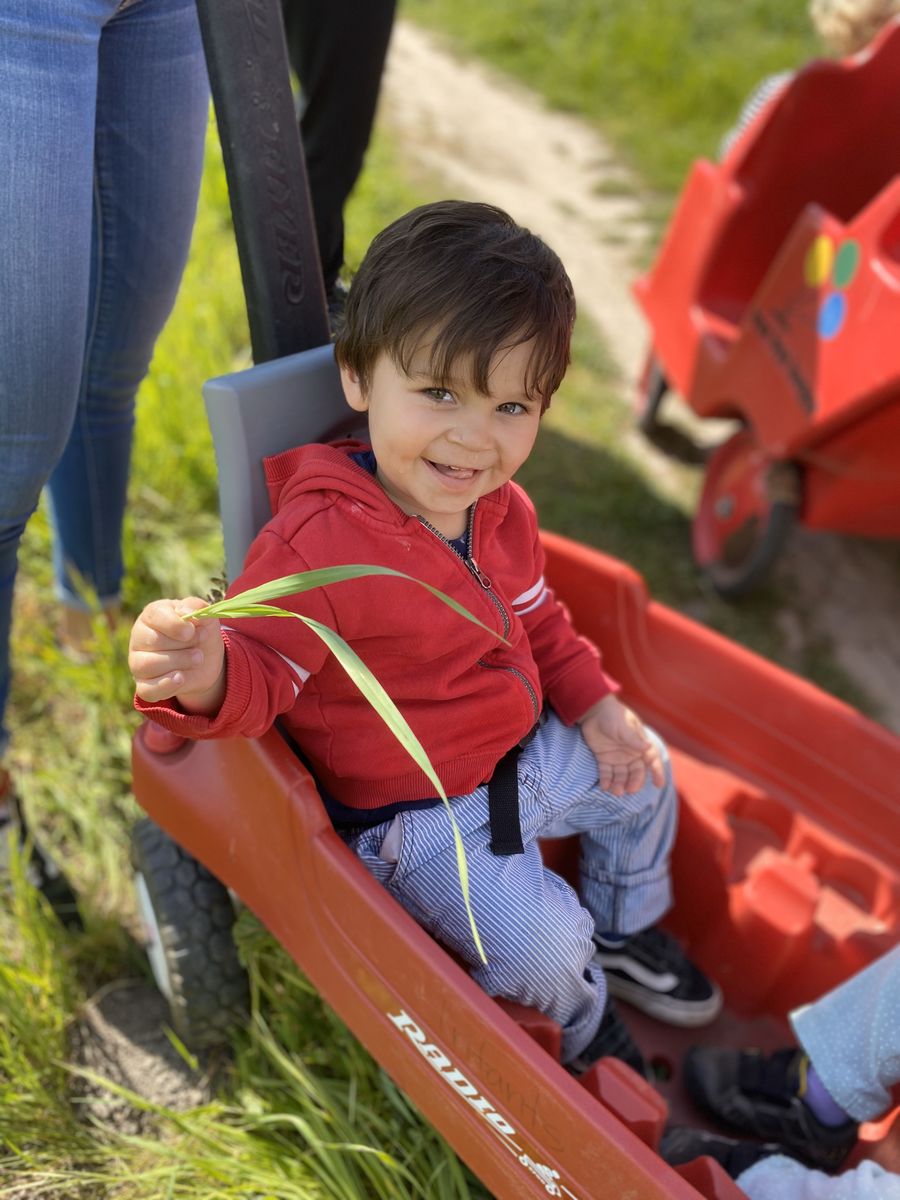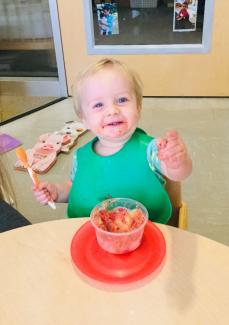
ECCES serves our youngest children (3 to 24 months) in two centers at UCSB, the Orfalea Family Children's Center (OFCC) on West Campus and the University Children's Center (UCC) at the Student Resource Building on the main campus.
The infant program is inspired by Magda Gerber's Resources for Infant Educarers (RIE) philosophy that promotes treating children with respect and as individuals. It honors infants and young children as equal partners in relationships to promote effective bonding and attachment while incorporating a deep respect and appreciation of the child. This approach encourages infants and adults to trust each other, learn to problem solve, and embrace their ability for self-discovery.
We embrace the Primary Caregiver model of care, in which each child bonds with a consistent caregiver who responds to the infant's individual schedule for feeding, napping, and diapering. This warm, loving relationship provides a secure base for infants to explore and learn in the environment. The individualized attention and care given during primary caregiving routines provide opportunities for the children to grow in language development, social skills, and self-awareness. Teaching staff work as a team in order to allow time for those uninterrupted one on one opportunities of learning while maintaining an environment that is stimulating, engaging, and loving for the group of children as a whole. The teaching staff also strive to consistently provide a safe and caring environment, both indoors and outdoors that extends and challenges a child's individual development and growth.
For questions regarding the Infant program, please contact:
The Orfalea Family Children's Center: Jenny Greaney, Infant/Toddler Program Coordinator, at 805-893-4904 or via email jennyd@ucsb.edu
The University Children's Center: Marina Nolte, Infant/Toddler Program Coordinator, at 805-893-7818 or via email mnolte@ucsb.edu
Infant Program Frequently Asked Questions
Full time: Monday - Friday
Part time: Monday/Wednesday/Friday or Tuesday/Thursday
Our ratios are defined as best practice which is 1:3 (1 caregiver to 3 children). When more than half the children in the class are over 18 months we increase enrollment by one child with a maximum of 10 children in the classroom. At that point there is one group in the classroom (the children over 18 months) who are a 1:4 ratio (1 caregiver to 4 children) and the other six children are in a ratio of 1:3 (2 caregivers to 6 children)
See Programs & Curriculum Overview page for more information about meals and nutrition.
Infant Meal Times
Meal times are a special time that infants and caregivers enjoy together. They provide opportunities for undivided attention and warm interactions. Young infants are bottle fed in their caregiver's arms. When infants are able to get into a sitting position by themselves, they start eating at small tables. The introduction of new types of food and eating utensils is discussed individually with each family.
Parents are responsible for providing all meals and snacks for infants less than one year of age. Baby cereal, baby crackers and food jars should be provided as needed. Do not include honey or peanut butter in your infant's lunch. Each child has a designated area in the refrigerator and kitchen cupboard for storage of food supplies. All opened foods are taken home at the end of each day.
Breastmilk or Formula
Mothers who breast-feed are encouraged to come to the Centers to do so; a lactation room is available for families who prefer privacy. Please introduce bottle feedings at home before your baby starts taking a bottle at the Centers to help the transition to Center feedings in your absence.
ECCES supports breastfeeding by accepting, storing, and serving expressed milk. We accept milk in ready-to-feed bottles, labeled with the infant's full name and date. The teachers will discard, after 1 hour, any formula, breast milk, or other liquid that is served but not completely consumed. Please bring breast milk or formula in small quantities to minimize waste (American Academy of Pediatrics). If formula or breast milk needs to be warmed, it will be warmed in water no more than 120 degrees Fahrenheit for no more then 5 minutes (frozen breast milk will be thawed in cold water first).
Infant Food Guidelines
For infants, all foods need to be cut lengthwise and into pieces no larger than 1/2 square inch.
We encourage mothers who are breastfeeding to come to the Centers to do so; a lactation room is available for privacy. For mothers who would like to breastfeed their child on site a comfortable private nursing area will be provided in the Center (OFCC) or within the Student Resource Building (UCC). Speak to your child's classroom lead teacher for specific information in regards to lactation room accommodations.
- Morning & Afternoon Snacks for children 12 months and older (with parent permission)
- Diaper Wipes
- Fitted sheet for crib
- Sunscreen (SPF 50 and greater) that can be applied on children 6 months and older (with signed parent consent). We ask that parents apply sunscreen each morning. Teachers will reapply after nap time.
It is the parent's responsibility to provide diapers for their child. Each child has their own clearly labeled cubby to hold their change of clothes, diapers, etc. Diapers are visually inspected at least every two hours, when a child wakes from nap, and whenever the child indicates discomfort or exhibits behavior that suggests a soiled or wet diaper. The diaper changing mat is cleaned and disinfected between each diaper change, and hand washing of the childcare provider and child is performed after each diaper change.

Routine and Schedule of Daily Activities
Infant daily learning is centered around building positive, warm, and nurturing relationships that are based on trust with the adults who care for them. Individualized caregiving routines such as feedings and diapering are some of the key interactions within which caregivers build relationships with the infants through language dialogue, eye contact, and respect for the infant as an active participant in the caregiving routines. The teaching teams in each infant classroom work together to provide materials and activities in the indoor and outdoor environments that will motivate, engage, and develop the infants' skill sets as they develop and grow. Individualized infant daily routines are based on the needs of the infants, observing their cues, and the ability of the caregivers to meet those individual needs within a group care setting.
Infant Daily Schedule (3 - 24 months)
Morning Arrival
7:30-8:30 - Infants arrive with their families and are greeted by the teaching staff. Parents fill out a child information sheet either before or upon their arrival. This information gives caregivers information about the child's night and morning routine, meal times, sleep and other important information about the child.
Breakfast/Bottle Feedings
8:30-9:30 - Infants have individualized feeding schedules. Teachers will hold babies who are bottle fed. Babies who are able to sit independently and who have similar eating patterns will sit in small groups at a table with teaching staff. Communication between the caregivers and the family about when your child eats and what foods to introduce is important in order to keep consistency and identify food allergies. At all meal times, we encourage mothers who are breastfeeding to come to the Centers to do so; a lactation room is available for privacy.
Morning Nap Time
9:30-10:30 - Younger infants in need of a morning nap, sleep after breakfast while older infants who do not need a nap can go outside to play or play inside.
Morning Free Play
9:30/10:30-11:30 - This is a free time for babies to explore inside, outside and/or special time with peers and caregivers. Activities are set up to provide the infants opportunities to engage and stimulate physical, motor, sensory, and cognitive development.
Lunch/Bottle Feedings
11:30-12:00 - Infants have individualized feeding schedules. Teachers will hold babies who are bottle fed. Babies who are able to sit independently and who have similar eating patterns will sit in small groups at a table with teaching staff. At meal times, we encourage mothers who are breastfeeding to come to the Centers to do so; a lactation room is available for privacy.
Afternoon Nap Time
12:15-2:30 - Infants who do one nap a day usually take an afternoon nap at this time. Younger infants who napped in the morning and aren't quite ready for their afternoon naps will have opportunities to play indoor or outdoors. Infants who nap in the morning and in the afternoon typically go down for their second naps between 2:30-3:30.
Afternoon Snack/Bottle Feedings
2:30-4:00 - A light snack is offered to babies waking up from their nap.
Afternoon Free Play
3:00-5:00 - Indoor/Outdoor free play gives infants the opportunity to explore indoor equipment, look at books, play with cause and effect toys, sing songs with teachers and explore their environment.
End of the Day
4:00-5:20 - Infants are able to explore materials and activities both indoors and outdoors as well as connect with other children in the sister classroom or over the toddler fence. Families arrive and are able to reconnect with their children, communicate with their teaching staff, gather their child's belongings and then depart for the day.
*These schedules are flexible and may change according to a child's individual needs as well as the groups' needs and interests.



